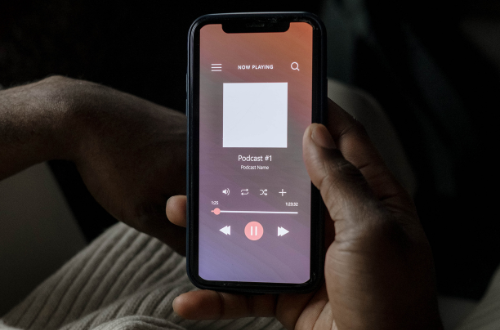
Top 10 Strategies to Learn English Pronunciation
When learning English, what you see isn’t always what you hear.
For example, the words tough and though differ by only one letter, but sound completely different.
Confusing as it may be, using correct English pronunciation is essential for being understood by others.
In this post, you’ll find 10 great ways to improve your English pronunciation skills.
Contents
- 1. Know What You Want to Sound Like
- 2. Subscribe to English Websites, Podcasts and YouTube Channels
- 3. Focus on Difficult Words and Break Them Down
- 4. Read Out Loud and Record Yourself
- 5. Listen Closely to Rhythm and Intonation
- 6. Practice with Native Speakers
- 7. Watch the News for Clear English Pronunciation
- 8. Don’t Make Assumptions Based on a Word’s Spelling
- 9. Check Dictionaries and English Pronunciation Guides
- 10. Slow Is Smooth, Smooth Is Fast
- And One More Thing...
Download: This blog post is available as a convenient and portable PDF that you can take anywhere. Click here to get a copy. (Download)
1. Know What You Want to Sound Like
English uses many diverse sounds. The pronunciation of English can vary dramatically from one region to the next. For example, the United Kingdom may be relatively small in size, but it’s rich with different English accents:
Depending on where you go and how long you’re going to be there, the first step is to understand how the locals sound. Practice sounding like they do. This will help you fit in and fully understand what they’re saying.
Whatever English accent you choose to study, you can also focus on which sounds make it unique. For example, to learn the American accent, put more time into mastering specific sounds such as the schwa sound and the two L sounds.
2. Subscribe to English Websites, Podcasts and YouTube Channels
There is an extremely wide variety of conversational English resources online that you can follow at your own pace, even if you’re still a beginner. Some YouTube channels have super-short videos on how to correctly pronounce difficult words.
Reading a book along with its audiobook can work quite well. This is a great way to pick up new vocabulary, get a glimpse into the culture and improve your pronunciation—all in one spot.
Similarly, there are lots of podcasts on just about every subject, and many of them offer transcripts. Some podcasts also cover popular and sometimes controversial topics in the English-speaking world! English songs can be another great way to improve your pronunciation.
Another resource is FluentU, which bases its English lessons on native video content.
FluentU takes authentic videos—like music videos, movie trailers, news and inspiring talks—and turns them into personalized language learning lessons.
You can try FluentU for free for 2 weeks. Check out the website or download the iOS app or Android app.
P.S. Click here to take advantage of our current sale! (Expires at the end of this month.)

3. Focus on Difficult Words and Break Them Down
Whenever you don’t know how to pronounce a weird word, just pause and pay close attention to that word’s features, like its spelling, syllables and meaning.
What you’ll want to do is take that long and complicated word and break it apart into pieces first.
For example, one of the most commonly mispronounced words in English is February . People keep pronouncing it as Feb-yu-airy. If you look closely, you’ll notice the r in the middle, and breaking it down reveals that it’s actually pronounced Feb-ru-airy.
You should look back to #1 for these words, too. Americans don’t ever pronounce that r in February. Regional pronunciations may not necessarily be proper English pronunciations.
Another common mistake is saying a letter out loud when it should be silent. For a lot of words ending in e like done , horse and fire , you won’t have to pronounce the e at all.
Here are more words that are mispronounced a lot, including comfortable and Wednesday :
If you still have difficulty breaking words up, then this guide will help.
To focus on a specific sound, you can even practice with tongue twisters. A lot of tongue twisters focus on similar sounds that can trip up English learners, so if you can say them accurately, then it’ll be way easier to use these sounds in regular conversation.
4. Read Out Loud and Record Yourself
One of the best ways to practice your English pronunciation on your own is to record yourself reading and speaking loudly and clearly, which helps you track your improvement.
Once you get over the sound of your own voice (we all hate the way we sound when recorded), you’ll find yourself making greater strides than you would otherwise.
You can also test out minimal pairs, which have similar sounds. These are words in English that are almost pronounced the same except for one sound, such as low — law and cut — cat , and they’re especially useful for practicing vowels.
Practicing solo doesn’t mean you can’t get feedback, either. There are interactive English pronunciation apps that you can study with. For example, ELSA Speak uses voice recognition technology to point out where you can improve your speaking.
5. Listen Closely to Rhythm and Intonation
Just as with songs, we can master difficult words by listening carefully to their rhythm and the way certain syllables sound.
The rhythm of words affects their meaning. Depending on which part of a word is stressed and where it’s placed in a sentence, it can either be a noun or a verb.
For example, the words refuse and refuse. If it’s heard as REH-fyuz, then we’re talking about garbage (noun), but if it’s heard as reh-FYUZ, then it means saying “no” or declining something (verb).
These two words are called heteronyms—they have the same spelling but different pronunciations. In this case, they differ only in syllable stress, but it’s enough to change the meaning completely.
The key here is to listen carefully to how words are used. Break them down when practicing them until you’re comfortable enough to use them in conversation.
6. Practice with Native Speakers
The best way to speak English like a native is to actually speak with one. Whenever you’re in class or taking a walk in the park, make sure that you’re only speaking English.
Even if you don’t know any native speakers living nearby, there are lots of great forums, websites and apps that allow language learners to connect and teach each other.
To find language exchange partners online, you can try HelloTalk and Tandem. For working on your spoken English specifically, there’s Lingbe, which connects you with native speakers from all over the world over voice call. italki is also great for practicing your English in a more organized tutorial setting since you can book video sessions with thousands of native English speakers.
7. Watch the News for Clear English Pronunciation
While you may not love to watch the news all the time, you can use it for mastering your English pronunciation. Newscasters tend to speak slowly and clearly to deliver their messages.
This video from Rachel’s English studies English pronunciation based on how newscasters speak:
Watching the news helps to put English words in their usual contexts and allows you to hear what they sound like in real life. Plus, news shows use lots of pictures and videos, which will make things easy to understand. If subtitles are available, this makes things even better.
A good website to use would be the BBC for British English or CNN for American English.
8. Don’t Make Assumptions Based on a Word’s Spelling
As I mentioned earlier, English is known for having words that look way different than the way they’re spoken.
You can see this with homophones, where two words have the same pronunciation but different meanings, such as see and sea as well as bye and buy . Vowel sounds in English can have different pronunciations based on where they are in the word, and they may even be silent.
English also has voiced and unvoiced consonants, where you have your mouth and tongue in the same position but the sound manages to be different. An example of this would be the “th” in teeth vs. the “th” in mother . With mother, you’re making a sound with your vocal cords for the th, while with teeth, you’re just puffing air out.
Because of these subtleties in pronunciation, there’s a lot about English that can be mind-bending! So keep an open mind and remember that there are a lot of English pronunciation rules that might feel strange at first.
9. Check Dictionaries and English Pronunciation Guides
It’s always good to keep a good English dictionary handy!
The Merriam-Webster dictionary app is a great example that includes a simple but very effective pronunciation guide for every word. There’s also the Macmillan Dictionary, which includes both American and British pronunciation. Wikipedia even has a simple pronunciation guide that’s pretty approachable.
While these are helpful and will tell you what you need to know, studying the International Phonetic Alphabet (IPA) will tell you exactly how to pronounce words. This is going to be challenging but once you master IPA, no English word will be too difficult. You can also check out this vowel pronunciation guide for detailed explanations about each vowel sound.
10. Slow Is Smooth, Smooth Is Fast
It’s easy to get excited and start speaking quickly once you learn how a word is pronounced, but the best thing to do is to be patient and keep practicing that word slowly until you can say it perfectly. Your friends and teachers understand this, so don’t worry about sounding funny or speaking too slowly.
Mastering English pronunciation may be the goal, but that doesn’t mean that there’s only one way to reach it. No matter your needs and wants, these strategies will help you there.
English pronunciation might feel strange at first, but as you keep using it, it’ll become more and more natural—and each sound that you master has a huge ripple effect on your speaking. Learning to speak English fluently is all about the journey and not just the end, so take your time and enjoy the ride!
Download: This blog post is available as a convenient and portable PDF that you can take anywhere. Click here to get a copy. (Download)
And One More Thing...
If you like learning English through movies and online media, you should also check out FluentU. FluentU lets you learn English from popular talk shows, catchy music videos and funny commercials, as you can see here:
The FluentU app and website makes it really easy to watch English videos. There are captions that are interactive. That means you can tap on any word to see an image, definition, and useful examples.
For example, when you tap on the word "searching," you see this:
Learn all the vocabulary in any video with quizzes. Swipe left or right to see more examples for the word you’re learning.

FluentU helps you learn fast with useful questions and multiple examples. Learn more.
The best part? FluentU remembers the vocabulary that you’re learning. It gives you extra practice with difficult words—and reminds you when it’s time to review what you’ve learned. You have a truly personalized experience.
Start using the FluentU website on your computer or tablet or, better yet, download the FluentU app from the iTunes or Google Play store. Click here to take advantage of our current sale! (Expires at the end of this month.)





















